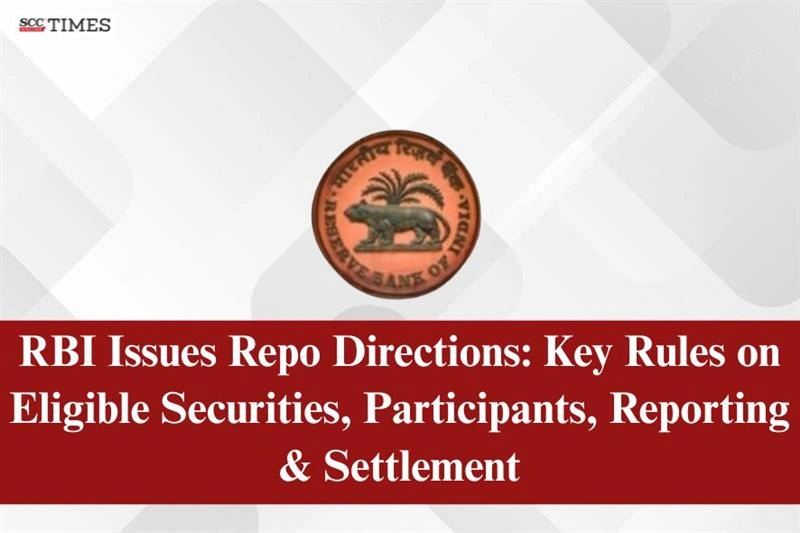On 11-11-2025, the Reserve Bank of India issued the Repurchase Transactions (Repo) (Reserve Bank) Directions, 2018 to regulate the financial system of the country. The provisions came into effect on 11-11-2025.
Background:
-
Although the notification of this Direction is issued by the heading- Master Directions- Reserve Bank of India (Repurchase Transactions (Repo)) Directions, 2025, they will be called Repurchase Transactions (Repo) (Reserve Bank) Directions, 2018.
-
These Directions supersede all other directions issued on this subject.
-
Applicable to:
-
repurchase transactions (Repo), undertaken on recognized stock exchanges, electronic trading platforms (‘ETP’) and Over-the-Counter (‘OTC’);
-
exchange traded repurchase transactions (Repo), procedure for execution and settlement of trades will be in accordance with the rules and regulations issued by the recognized stock exchange/Securities and Exchange Board of India.
-
-
These Directions will not apply to repo/reverse repo transactions under the Liquidity Adjustment Facility and the Marginal Standing Facility.
Key Provisions:
-
Securities eligible for repo will include:
-
Government securities issued by the Central Government or a State Government;
-
Listed corporate bonds and debentures, subject to the condition that no participant shall borrow against the collateral of its own securities, or securities issued by a related entity;
-
Commercial Papers and Certificate of Deposits;
-
Units of Debt Exchange Traded Funds;
-
Municipal Debt Securities.
-
-
Eligible participants in repo transaction:
-
Any regulated entity;
-
Any listed corporate;
-
Any unlisted company, which has been issued special securities by the Government of India, using only such special securities as collateral;
-
Any All-India Financial Institution- Exim Bank, NABARD, NHB, Small Industries Bank of India and National Bank for Financing Infrastructure and Development, constituted.
-
-
Repos will be undertaken for a minimum period of 1 day and a maximum period of 1 year.
-
Trading of Repo transactions can be doen on any recognized stock exchange, or on any electronic trading platform duly authorized by the Reserve Bank of India or on the over-the-counter market.
-
Repo and tri-party repo trades can use any agreed method—bilateral, multilateral, quote- or order-driven, anonymous or not.
-
All repo trades not done on recognized exchanges or approved platforms must be reported within 15 minutes:
-
Government securities- Clearcorp Repo Order Matching System (CROMS);
-
Other eligible securities- FIMMDA Trade Reporting and Confirmation System (F-TRAC).
-
-
Settlement of Trades:
-
First leg of all repo transactions will settle either on a T+0 or T+1 basis;
-
All repo transactions will settle on a Delivery versus Payments (DvP) basis;
-
All repos in government securities will settle through Clearing Corporation of India Limited or any other clearing agency approved by the Reserve Bank;
-
All repos in other eligible securities will settle through the clearing house of exchanges or any other entity which has been approved by the Reserve Bank.
-
-
Pricing of collateral, haircut and margining:
-
Collateral Pricing:
✓ First leg: priced at current market value;
✓ Second leg: first leg price + interest.
-
Haircuts/ Margins: It will be decided by clearing house or agreed bilaterally, subject to:
✓ Listed corporate bonds/debentures: minimum 2% (extra for tenor/illiquidity);
✓ Commercial Papers and Certificate of Deposit: minimum 1.5%.;
✓ Local authority securities: minimum 2% (extra for tenor/illiquidity).
-


